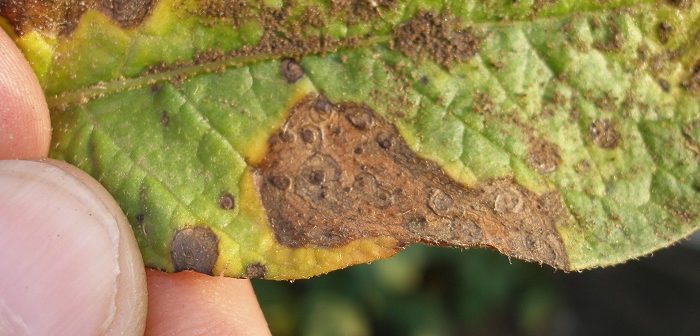Wimbledon tennis tournament has announced its latest start since 1895 this year, commencing on 3 July. For potato growers who have traditionally started Alternaria prevention treatments timed to coincide with the second week of the competition, it could be too late this season, according to Syngenta Field Technical Manager, Douglas Dyas.
For a sporting start to the treatment programme, he suggests growers should forget the tennis and follow the roar of the British Lions in New Zealand. The first rugby Test on 24 June, and two subsequent Tests on the 1 and 8 July, could be far more appropriate to kick off the Alternaria spray scheduling.
“All the research and experience, in the UK and Europe, is that Alternaria fungicide treatments have to be applied preventatively,” advised Douglas. “That means keeping ahead of infection, and protecting crops through periods of stress when they are most susceptible to attack.”
He pointed out that this season growers have a significant advantage for disease control, with the approval for Amistar as a foliar application for Alternaria. “There is the chance to significantly extend the control window, with initial use of Amphore Plus, followed by inclusion of Amistar in the early blight programme”
Douglas highlighted that extended prevention of Alternaria infection, to stop early leaf senescence, could prove especially important this season on crops that have been relatively late to emerge in dry conditions and cool soils.
“We have seen that even low levels of early Alternaria, which may appear to cause minimal damage, can potentially allow more virulent strains of the pathogen to attack later on and cause rapid leaf defoliation,” he warned, “with subsequent loss of crop yield and tuber quality.”
Initial treatments with Amphore Plus target earlier infections of the Alternaria pathogen, particularly the strain A. alternata. By applying a higher rate of 150 g/ha difenoconazole in each application, it rapidly builds up important protection – along with a full rate of mandipropamid (Revus) co-formulated in the product for outstanding late blight prevention.
“Growers and agronomists can then switch to Amistar for its proven efficacy on A. solani, which testing by Syngenta and NIAB, in conjunction with leading UK independent agronomists, has shown to typically come in slightly later in the season,” he added. Amistar can be tank mixed with Revus, Shirlan and other blight fungicides for complete protection of the green leaf.
Douglas advocated growers should also take account of other risk factors, such as variety, soil type, irrigation, nutrition and previous history of disease, to assess the start timing to the Alternaria programme. This year’s Lions Tour Test kick-off on the 24 June could be a timely reminder should these risk factors apply.




